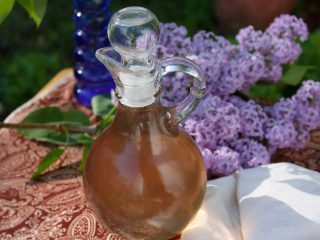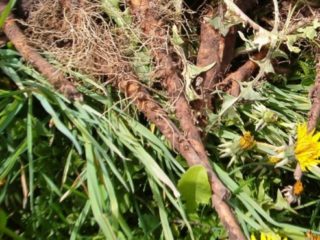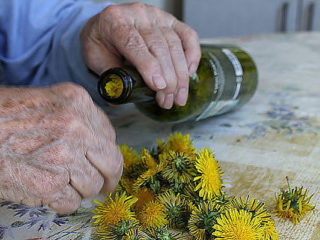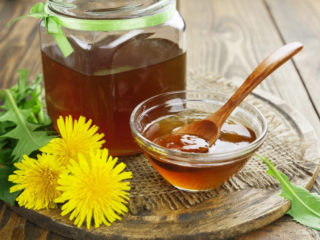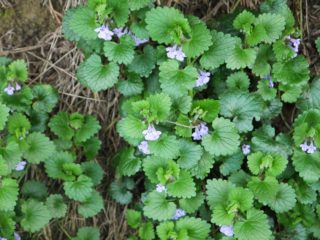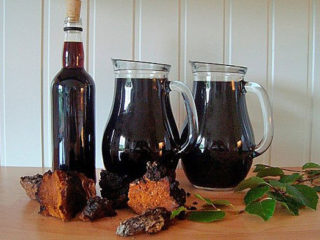Content
Djungarian aconite is one of the most poisonous plants. However, when used correctly, the herb can be beneficial and help cure diseases.
Description of the species
Dzungarian aconite, or fighter (Aconitum soongaricum), is a perennial plant from the Buttercup family. Also found under the names wolf root, skullcap and king grass, it has a long stem, bare or pubescent. The leaves of Djungarian aconite are round-heart-shaped and arranged in an alternate order. They are dark green above, slightly lighter at the bottom, dissected into several wedge-shaped lobes. The rhizome consists of large tubers fused together in a horizontal chain like a rosary.

Dzungarian aconite can rise up to 2 m above the ground
In the second half of summer, the plant bears terminal inflorescences, represented by large blue-violet buds of irregular shape. By autumn it bears fruit - dry three-leaf leaves with numerous seeds.
Where does Djungarian aconite grow?
The perennial plant is widespread in North America, China, Europe, Nepal and the Himalayas, and Russia. Most often it chooses river banks and alpine meadows, and is found in mixed forests.
Plant toxicity
Djungarian aconite is considered a very poisonous plant and poses a great danger to human health. Just 1 g of perennial root is enough for poisoning to be fatal. The highest concentration of toxic substances is present in the tubers of the plant, but the above-ground parts are also very harmful. Intoxication is caused not only by ingestion of Djungarian aconite, but also by external contact with its juice, as well as inhalation of the aroma.
The degree of toxicity depends on the time of year and location of the perennial. Specimens growing in wet meadows and swamps are considered less toxic. Summer tubers are not as poisonous as autumn and spring ones. At the same time, for medicinal purposes, it is recommended to collect underground parts before or after the end of the growing season.
Collection is carried out exclusively with gloves and a protective face mask. When the plant sap comes into contact with the skin, it causes itching and burning, followed by numbness, similar to the effect of a local anesthetic.
Composition and value
Dzungarian aconite is taken for treatment, although it is very poisonous, it also contains useful substances. Among the active components are:
- natural sugars;
- saponins;
- coumarins and resins;
- starch and flavonoids;
- citric, linoleic and palmitic acids;
- pseudoaconitine and daucosterol;
- ascorbic acid;
- mesoinosidol;
- inositol and tannins;
- atizine alkaloids;
- microelements;
- stearic and benzoic acids.
The toxicity of Djungarian aconite is due to the presence of aconitine alkaloids in its composition. Substances in this group can cause respiratory arrest and cardiac paralysis in less than an hour.
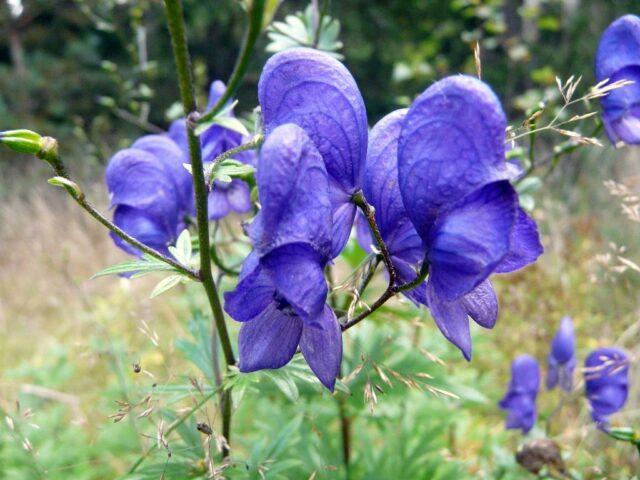
There are no specific antidotes to aconitine, the most dangerous component of aconite.
Medicinal properties
Poisonous Djungarian aconite is used in folk medicine in minute dosages to treat diseases. Its valuable properties are used:
- for hypertension, arrhythmia and angina pectoris;
- with anemia;
- for hormonal imbalances and infertility;
- for diabetes mellitus;
- for diseases of the kidneys and gall bladder;
- for bronchitis, asthma, tuberculosis and pneumonia;
- for neuralgic disorders;
- for inflammatory diseases and joint injuries;
- for psoriasis, eczema and neurodermatitis.
Externally, Djungarian aconite is used in the treatment of scabies and pediculosis. The plant has a pronounced antiparasitic effect.
Recipes for decoctions and tinctures of Djungarian aconite
Most often, the poisonous plant is used to prepare strong tinctures. The active substances of the perennial dissolve best in an alcohol base. There are also recipes for aqueous decoctions of the plant.
Tincture for heart disease and oncology
Djungarian aconite depresses cardiac activity, but in small dosages it can be beneficial for hypertension, arrhythmia and cancer. The recipe for the medicinal tincture looks like this:
- 10 g of flowers or seeds of the plant are poured into 500 ml of high-quality vodka;
- put in a closed glass container in a dark place for two weeks;
- From time to time the vessel is removed and the contents are shaken.
After the expiration date, the tincture is filtered through cheesecloth. You can take it orally according to the “slide” scheme - with a gradual increase, and then a smooth decrease in dosage.
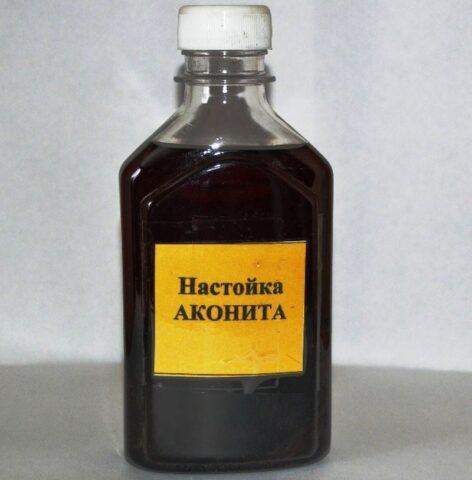
Aconite tincture is consumed in the morning on an empty stomach once a day.
Tincture for rubbing
The product for external use is prepared according to the classic recipe, but the volume of medicinal raw materials is increased. The algorithm looks like this:
- 50 g of crushed root is poured into 500 ml of vodka;
- shake the closed container and put it in a dark place for 14 days;
- After the time has passed, filter through folded gauze.
The finished tincture is used for rubbing the skin for radiculitis, rheumatism, sprains and bruises. It can also be used to remove lice and scabies mites. It is forbidden to take the product internally; it is too concentrated.
Decoction for furunculosis
For ulcers, boils and abscesses, prepare an aqueous decoction of Djungarian aconite tubers. The recipe looks like this:
- 10 g of crushed raw materials are poured into 1 liter of hot water;
- bring to a boil;
- Boil over medium heat for 20 minutes;
- cool and filter the product.
The prepared decoction is used to wipe boils and ulcers. Aconite has strong anti-inflammatory properties and helps speed up the healing of the epidermis.

A decoction of aconite roots is used for hematomas, sprains and even fractures.
Application of tincture of Djungarian aconite
Alcohol tincture of aconite is used for serious diseases. At the same time, it is important to follow proven algorithms and not violate the proposed dosages.
How to take Djungarian aconite for oncology
Aconite can be beneficial for cancer. It is not accepted to use it in the early stages and in the active treatment phase. But in the last stages of cancer it is recommended quite often. Reviews of the use of Djungarian aconite tincture confirm that in some cases the herbal preparation significantly prolongs the life of patients. In addition, there is a strong analgesic effect, which makes it possible to reduce the use of appropriate medications.
For medicinal purposes the following remedy is prepared:
- dry tuber of the plant is crushed in the amount of 5 g;
- pour 500 ml of vodka into the raw material;
- put the product in a dark place to infuse for two weeks;
- When ready, strain the sediment through a sieve or folded gauze.
The tincture should be consumed three times a day, just one drop, previously diluted in a small amount of water. Every day the dosage is increased by another drop, until the single volume is ten drops.
After this, the drug in the specified amount is taken for ten days in a row. Then the dosage begins to be gradually reduced and therapy ends when the single volume is again one drop.Upon completion of the course, you need to take a break for 1-5 months.
In the treatment of boils and purulent wounds
Djungarian aconite relieves inflammation, has a pronounced bactericidal effect and promotes rapid skin restoration. For boils and purulent wounds, a decoction of the plant is used. The recipe looks like this:
- dry aconite tubers are crushed using a sharp knife or grater;
- pour 5 g of raw material into 500 ml of hot water;
- Boil on the stove after boiling for 20 minutes;
- Cool the product and filter through cheesecloth.
Dip a cotton pad into the prepared warm solution and wipe the affected areas. Immediately after using the Djungarian aconite decoction, you should thoroughly wash your hands.
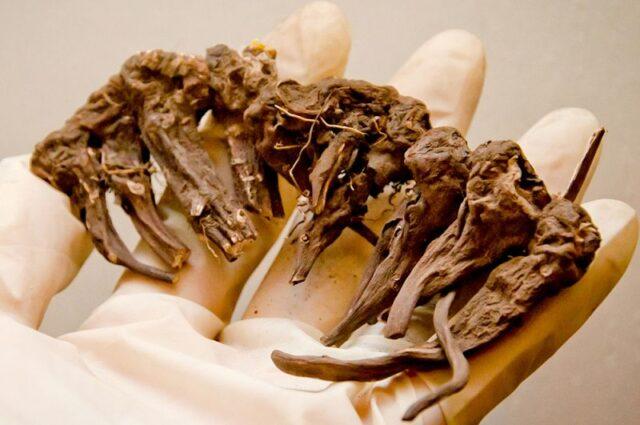
It is not recommended to treat the skin of the face and neck with tinctures and decoctions of aconite.
For pain and bruises
Djungarian aconite has pronounced analgesic properties and has a good effect on bruises, joint ailments, neuralgia and migraines. For treatment, prepare the following tincture:
- grind 10 g of dry plant tuber to a powder;
- pour 500 ml of vodka or diluted alcohol into the raw material;
- Infuse in a dark place for a week.
After the drug acquires a rich brown tint, it will need to be filtered through gauze. Tincture of Djungarian aconite is used for compresses for rheumatism and radiculitis and for rubbing for neuralgia and migraines. In all cases, the product is applied to the affected areas in minimal quantities of no more than 30 drops, and after 40-60 minutes the skin is washed with warm water.
Side effects of Djungarian aconite
Officially, the lethal dosage of Djungarian aconite is considered to be 1 g of fresh crushed root. In decoctions and tinctures based on the plant, the concentration of hazardous substances is much lower. However, if dosages are not observed, medicinal products can still cause severe poisoning.
Symptoms of aconite intoxication are:
- severe burning of the mucous membranes in the mouth and swelling of the tongue;
- increased salivation, perspiration and frequent urination;
- dilated pupils and blurred vision;
- headache, facial flushing and tachycardia;
- nausea and vomiting;
- trembling of limbs and convulsions;
- suffocation and fainting.
Djungarian aconite poisoning develops very quickly; in the absence of medical assistance and a serious overdose, cardiac arrest can occur in less than an hour. When the first characteristic signs appear, it is necessary to immediately induce vomiting in the patient, and then force him to drink a large amount of clean water and cleanse the stomach again.
Washing at home will remove some toxins from the body, but will not eliminate the poisoning completely. You should call a doctor before you begin providing assistance.
Contraindications
Despite all its beneficial properties, tincture of Djungarian aconite poses a great danger to the body. It is necessary to completely stop using it:
- during pregnancy;
- during lactation;
- with hypotension and bradycardia;
- for chronic liver and kidney diseases;
- for inflammatory heart diseases.
It is strictly forbidden to give tincture and decoction of aconite to children and adolescents under 18 years of age.This applies not only to internal but also external use of drugs; even through the skin the plant has a toxic effect. It is not recommended to resort to treatment with poisonous herbs if you are prone to allergies, especially if you have previously suffered anaphylactic shock.
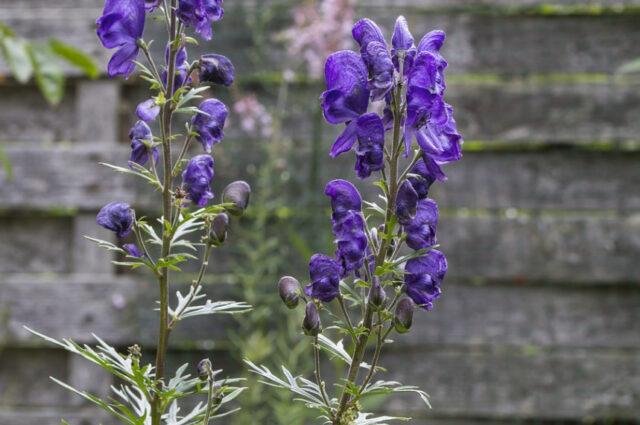
Poisoning with Djungarian aconite develops within two hours after an overdose
Reviews of Djungarian aconite tincture note that it is advisable to coordinate any use of the plant with your doctor. The drug can be made at home or bought at a pharmacy, but it is prohibited to prescribe it to yourself without permission. Only a qualified professional can weigh the risks associated with using a plant in a particular situation.
Conclusion
Djungarian aconite is a very toxic plant that requires careful use. In homeopathic dosages, tinctures and decoctions based on perennials have a beneficial effect on the body and increase its resistance even to cancer. But exceeding the permitted volumes can have serious consequences, including death.
Reviews of treatment with Djungarian aconite
